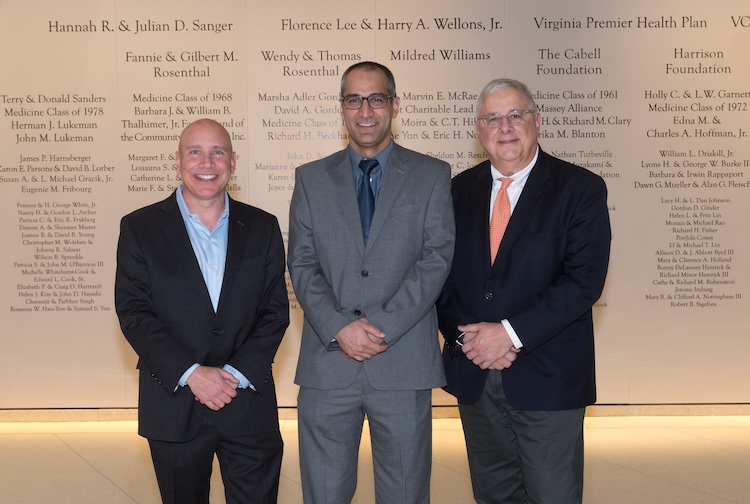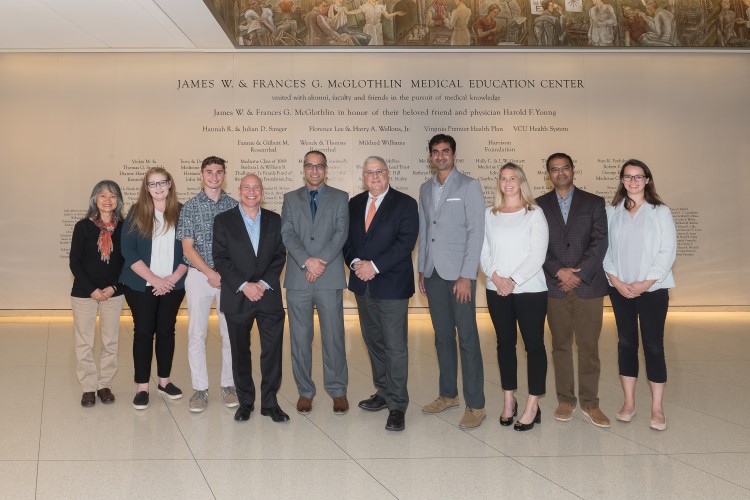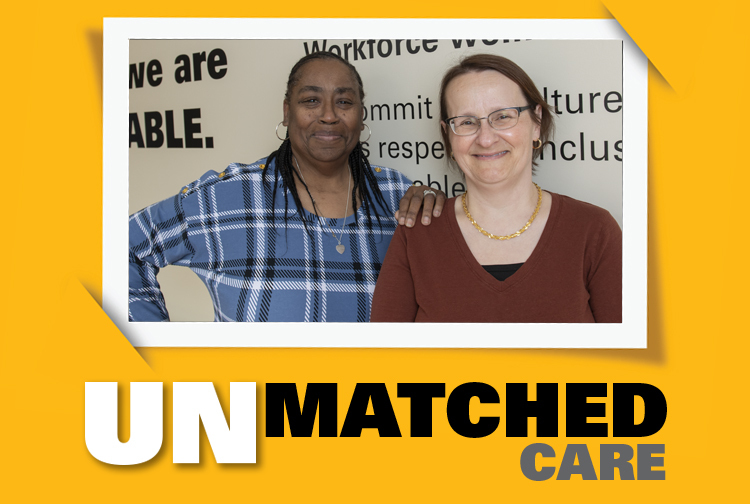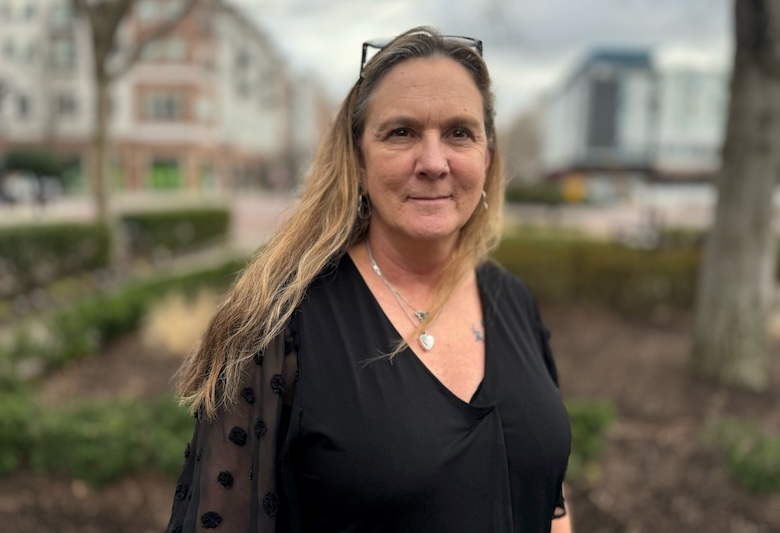
VCU Health Hume-Lee Transplant Center completes 100th rare procedure to treat chronic pancreatitis
VCU Health Hume-Lee Transplant Center is one of few national transplant centers performing total pancreatectomy with islet cell autotransplantation, in coordination with a lab that is gaining support from national and international researchers.
February 27, 2024
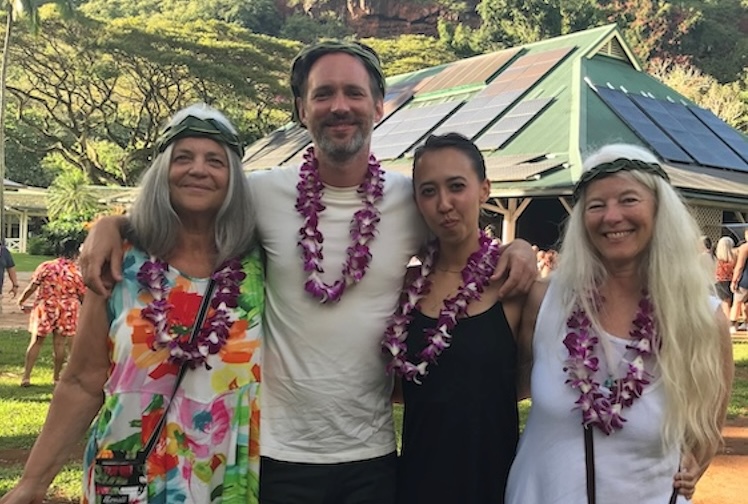 VCU Health patient Elizabeth Garniss has gained a better quality of life since her TP-IAT procedure, allowing her to more comfortably take trips with family and friends. (Left to right: Elizabeth, her son, his girlfriend, and Elizabeth’s childhood best friend) (Contributed photo)
VCU Health patient Elizabeth Garniss has gained a better quality of life since her TP-IAT procedure, allowing her to more comfortably take trips with family and friends. (Left to right: Elizabeth, her son, his girlfriend, and Elizabeth’s childhood best friend) (Contributed photo)
By Jeff Kelley
How painful is chronic pancreatitis?
The progressive inflammatory disease affects how the pancreas regulates blood sugar and helps the body digest food. Chronic pancreatitis symptoms include pain in the upper abdomen — especially after eating — and weight loss. The symptoms get worse over time. Experts say the condition causes about 86,000 hospital stays in the United States each year.
For high school English teacher Elizabeth Garniss, the pain and discomfort kept her bedridden and away from her classroom for many days.
After a rare and complicated surgery to alleviate the excruciating pain — a procedure requiring a large incision and months of recovery — Garniss, in bed at VCU Medical Center, stayed on pain medication for only a few days before she stopped taking it.
“The nurses kept saying I could have more pain meds if I needed them, but I was used to such a high level of constant pain from pancreatitis that surgery was nothing,” the 66-year-old said. “The nurses and doctors just were shocked.”
Now, nearly two years later, Garniss says her quality of life has dramatically changed.
“My life is so good,” she said. “My life is so, so good.”
For patients who have received the maximum medical management possible for chronic pancreatitis, but achieved no results, there is a surgical treatment with a high success rate: total pancreatectomy with islet cell autotransplantation, or TP-IAT. And VCU Health Hume-Lee Transplant Center is one of a few centers in the nation to offer it.
I don't take anything for granted because I feel like I've been given my life again. My life was unbearable. [Now], I garden, I lug bags of soil. I do everything that I want to do. I don’t want to go skydiving — but I could.
Elizabeth Garniss, patient
This month, Hume-Lee conducted its 100th TP-IAT since surgeons began performing the operation in July 2016. That’s considered high volume for the procedure, making it a major milestone at a center that sees more than 500 total transplant surgeries a year.
“It is a remarkable achievement,” said Aamir Khan, M.D., medical director of the Islet Cell Transplant Program, who also serves as the principal surgeon for this procedure and runs the islet clinic, as well. “There are not many programs that have reached this mark, and it just goes to show the reputation and breadth of experience that our program has.”
A complex procedure using innovative methods
TP-IAT is a complicated, long procedure involving both the operating room and a nearby VCU Health laboratory specializing in isolating and purifying insulin-producing islet cells, which are found in the pancreas. The surgery removes the entire pancreas, isolates the islet cells and then relocates these cells to the patient’s liver where they continue to act in their primary function: insulin production (blood sugar control).
“But when you remove the entire pancreas, it also causes difficulty to manage diabetes in patients because you're removing the insulin-producing cells from them, therefore it is necessary to transplant the islet cells back into the patients to potentially prevent diabetes,” said Mazhar Kanak, Ph.D., director of VCU Health’s Pancreatic Islet Cell Transplant Lab, located on the MCV Campus in downtown Richmond.
Once removed from the body, the pancreas is taken to the lab by a team of islet lab technicians. At the lab, Kanak and his team extract the islets and return them to the surgeons — a process that can take up to eight hours.
When the cells are prepared and ready for implantation, surgeons infuse them into the patient’s liver through a major blood vessel that supplies blood to the liver. It is there the islet cells begin producing insulin as they normally would.
From word of mouth to Richmond
Adults and children come to Hume-Lee Transplant Center from around the country to receive the surgery, which is known to bring a dramatic decrease in patient’s reported pain and reliance on pain medication.
The center gets many of its TP-IAT referrals from social media — Facebook and Reddit, in particular, where people with chronic pancreatitis or generalized abdominal pain can connect, console each other and share treatment options. Hume-Lee often pops up in the comments.
Before her May 2022 surgery, Garniss was living in Boston, couch-ridden, in unending agony. On social media, Garniss met Jolie Dunham, who had received the procedure years prior at VCU Health and regularly champions Hume-Lee online.
“I wish there was more I could do to educate doctors throughout our country about what VCU Health and this surgery can offer,” said Dunham, a retired teacher and classically trained opera singer who spent years in and out of hospitals with excruciating pain before this procedure. “I have people contact me daily from all over the country because their doctors have no knowledge of TP-IAT. As a former educator, I want to do anything I can to promote this information and the care offered at VCU Health.”
After months without answers or a diagnosis from other doctors, Garniss made the trip to Richmond to be evaluated.
David Bruno; M.D., FACS, interim chair of VCU Health Hume-Lee Transplant Center, Aamir Khan; M.D., medical director of Hume-Lee’s Islet Cell Transplant Program and Marlon Levy; M.D., interim senior vice president of VCU Health Sciences and interim CEO of VCU Health System. (VCU Enterprise Marketing and Communications)
“One of the things I love about VCU Health is they set up and coordinate everything — all the tests and specialists. They even [help you find] a place to stay at The Doorways. I’ve never had such compassion as I had at VCU Health,” she said.
She met with Marlon Levy, M.D., the former Hume-Lee chair who now serves as interim CEO of VCU Health and senior vice president for VCU Health Sciences. He brought the TP-IAT program to VCU Health on his arrival in Richmond from Texas.
“Dr. Levy validated my feelings. I thought I was going crazy, but he listened when doctors at other medical centers didn’t,” Garniss said.
“The reason we get so many referrals and we have such a high volume for TP-IAT is that we're willing to listen,” Khan said. “The patients who come to us are still looking for answers, and we want to help find them.”
Still, TP-IAT is a last-resort operation for patients who no longer have a good quality of life and are desperate to find relief from constant suffering. A full medical assessment will determine if they qualify for the procedure, but David Bruno, M.D., F.A.C.S., interim chair of Hume-Lee, says their care teams “do everything we can to get that patient to VCU Health for answers and surgery should they need it.”
“Chronic pancreatitis is debilitating, and the result for most is life changing,” Bruno said. “In the chance we cannot help, we are at least able to give them a pathway of what to do next. We always start at ‘Yes."
The operating room meets lab science
When Levy joined VCU Health, he recruited an islet researcher and former colleague to lead the islet cell team — Kanak, who immediately took the job in December 2015.
“I knew that this was the place to be,” Kanak said.
Kanak’s islet cell lab is an FDA-regulated clean room serving dual purposes: for TP-IAT surgeries, but also for proficiency training to improve islet isolation procedures using pancreas from deceased donors. Kanak and his team of five other scientists are conducting several studies around islet cells, one of which is looking at a therapy to reduce inflammation in these cells post-transplantation.
The reason we get so many referrals and we have such a high volume for TP-IAT is that we're willing to listen. The patients who come to us are still looking for answers, and we want to help find them.
Aamir Khan, M.D., medical director of the Islet Cell Transplant Program
This year, the lab was awarded a contract to serve as an Islet Isolation Center for the Integrated Islet Distribution Program (IIDP), an organized effort to provide human islet cells to national and international researchers who are studying pancreatic cellular biology and the processes of diabetes. VCU Health is among the 10 total centers within the United States that prepare cells and send them to researchers.
VCU Health performed its first IIDP procedure in October, and shipped about 250,000 islet cells to 24 researchers in the U.S. and Canada.
“It was a real success,” Kanak said. “This contract adds a lot of visibility to our lab and our TP-IAT program, while helping researchers study the diseases of the pancreas.”
Life after TP-IAT surgery
This procedure has a high success rate in alleviating chronic pancreatitis symptoms by dramatically decreasing a patient’s discomfort thus significantly improving their quality of life.
After surgery, patients report “good” to “excellent” pain control and have a significant decrease in pain medication use. Islet cell transplant helps patients prevent post-pancreatectomy diabetes, which can be hard to control otherwise.
Most post-operative patients experience excellent blood-sugar control, though some diabetes medications may be required in the long-term. Patients are required to take pancreatic enzymes with meals to replace digestive enzymes that were once normally produced in the pancreas.
Now living in Florida, Garniss’ life is back to normal — and then some.
“I don't take anything for granted because I feel like I've been given my life again. My life was unbearable. [Now], I garden, I lug bags of soil. I do everything that I want to do,” she said. “I don’t want to go skydiving — but I could.”
The TP-IAT program is a collaborative clinical and laboratory team. The program was brought to VCU Health Hume-Lee Transplant Center by Marlon Levy, M.D., former chair of the center who now serves as interim CEO of VCU Health System and interim senior vice president of VCU Health Sciences. (VCU Enterprise Marketing and Communications)
(Left to right: Yoshiko Tamura; MS, Lyndy Johnson; MSN, Elijah Burch; MS, David Bruno; M.D., F.A.C.S., Aamir Khan; M.D., Marlon Levy; M.D., Mazar Kanak; Ph.D., Allison Lewis; MSN, RN, Prathab Balaji Saravanan; Ph.D., Kate Best; MHA.)

